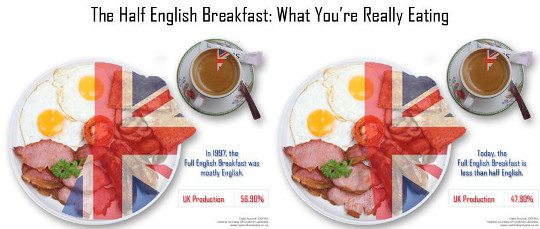The full English breakfast?
Despite British cuisine being unceremoniously and continually mocked by our continental neighbours, it’s a part of British culture that many an expat will miss. Whether you’re hankering for Marmite in Malawi or pining for proper chips in the USA, great comfort can come from eating the foods you enjoyed as a child.
If any dish embodies British culture (perhaps with the exception of the Sunday roast) it’s the good old greasy fry-up. The overly generous combo of bacon, eggs, black pudding, baked beans, tomatoes, mushrooms, toast and a mug of tea has set the honest working men of Britain up for the day and dampened hangovers since time immemorial. Whilst other nations may have equally gluttonous morning menus, there’s something peculiarly unique about a full English breakfast that can’t be emulated anywhere in the world. Or so we ultra-patriotic types like to think.
Recent research has revealed that less than half the ingredients we use for the quintessential English breakfast actually spring from UK soil. Analysis of production data from DEFRA has shown that between 1997 and 2012 the UK share of production of English breakfast ingredients decreased by 10 percentage points, from 57% to 47%. If the ingredients aren’t uniquely British, then surely this meal can be created effectively anywhere in the world?
As any self-respecting Briton knows, protein-rich, salty pork is the cornerstone of any proper breakfast, and this is reflected in our consistently high pork consumption over the last 20 years. However, in the ’90s around 10,900,000 head of pigs were taken to slaughter annually in the UK, accounting for 69% of our pork consumption. Today, UK production has fallen by nearly 30%, with only 7,810,000 pigs slaughtered in the UK in 2012, accounting for just 49% of our consumption. You’re far more likely to find a Danish or Dutch piggy on your plate, with 85% of our 7,290,000 imported head of pigs sourced from these two nations alone.
Tomatoes, mushrooms and eggs have seen a similar fall. 27% of our tomatoes were grown in British greenhouses in 1997; today that figure has shrunk by a third to around 18%. Of the 1,892,000 tonnes of mushrooms the UK eats every year, only 41% are British, a reduction from 57% in 1997. 13% of our eggs are now sourced from overseas, a rise of 6%.
There is some good news: UK wheat production has risen over the past 15 years. You can rest assured that at least British toast can’t be found anywhere else in the world!
So, if you’re a British expat or are considering moving abroad, don’t worry about missing your full English, your Ulster fry or your Scottish breakfast; it wasn’t really British in the first place.
To view a more detailed breakdown of the UK’s import and export data, visit the Cosford Caravans website.


Leave a Reply